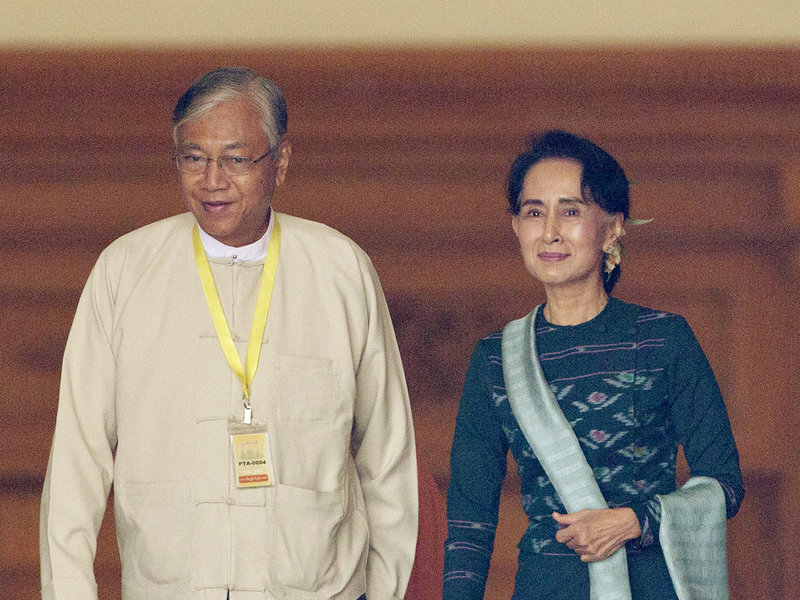
U Htin Kyaw (left), newly elected president of Myanmar, walks with National League for Democracy leader Aung San Suu Kyi at Myanmar’s Parliament in Naypyitaw on Tuesday.
Myanmar-The Myanmar parliament has chosen U Htin Kyaw as the country’s first civilian president in nearly five decades during a historic vote in parliament. The National League of Democracy’s (NLD) U Htin Kyaw, who has the auspices of pro-democracy icon Aung San Suu Kyi, won the vote with a comfortable majority.
U Htin Kyaw, a close ally of Nobel winner and democracy icon Aung San Suu Kyi, won the legislature’s vote. Suu Kyi was barred from running herself by the country’s constitution, drafted by the former military leaders, because she has two foreign sons.
Former army General Myint Swe, a hardliner nominated by the military, is to become the vice president while Henry Van Thio, an ethnic leader representing the upper house on behalf of the NLD, may take the role of junior vice president.
U Htin Kyaw won 360 of the 652 votes cast by the two houses of Parliament.
Suu Kyi apparently chose U Htin Kyaw “not because he has political experience, since he doesn’t, but because she trusts him.”
The south-east Asian nation, formerly Burma, is on the verge of a historic political transition as the country is desperately attempting to crawl out of the decades-long junta rule. Suu Kyi, who is barred from taking the top post constitutionally, has made it clear she will function “above” the president, meaning anyone who is nominated as president will merely be a stand-in.
Lawmakers applauded as the vote count confirmed 70-year-old U Htin Kyaw as president. The legislature also confirmed two vice presidents, one each from the ruling and opposition parties.
U Htin Kyaw has never held a public office. He’s been a member of Aung San Suu Kyi’s inner circle for years, and Suu Kyi has made it clear that Kyaw will serve as her proxy.
“Today’s result is because of the love of people for her. It is the victory of my sister Aung San Suu Kyi,” U Htin Kyaw said after the vote.
Suu Kyi, 70, was awarded the Nobel Peace Prize in 1991 and it was around this time that U Htin Kyaw became involved in party work. She enjoys unrivalled popularity both as the daughter of the country’s independence hero and as a central figure in the decades-long democracy struggle.
His father-in-law was already a prominent NLD leader and his wife is a member. U Htin Kyaw, who had known Suu Kyi since grade school, became her confidant and adviser on foreign relations.
However, the military still restrains the power of the new civilian authorities as it controls the home, defense and border-affairs ministries, as well as the country’s security forces and civil service. It can thus frustrate the NLD’s attempts to reform. Revising the constitution may prove even more difficult. That would require a parliamentary supermajority exceeding 75%. The army reserved seats give it a veto. In a national crisis, as defined by the generals, the army can still legally seize control again.
